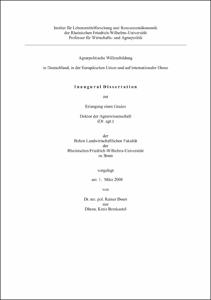Agrarpolitische Willensbildung in Deutschland, in der Europäischen Union und auf internationaler Ebene


| dc.contributor.advisor | Heckelei, Thomas | |
| dc.contributor.author | Doerr, Rainer | |
| dc.date.accessioned | 2020-04-14T07:18:20Z | |
| dc.date.available | 2020-04-14T07:18:20Z | |
| dc.date.issued | 21.04.2010 | |
| dc.identifier.uri | https://hdl.handle.net/20.500.11811/4182 | |
| dc.description.abstract | Agrarpolitische Willensbildung ist ein Teil der allgemeinen politischen Willensbildung, allerdings gekennzeichnet durch arteigene Unterschiede, besondere Eigentümlichkeiten und sprichwortliche Undurchschaubarkeiten. Die vorliegende weitgespannte Untersuchung versucht Einblick in die Ablaufprozesse zu verschaffen und Erklärungen zu liefern.
Die nationale Ebene ist in der Regel nur Ausgangspunkt agrarpolitischer Willensbildung. Die endgOltigen Entscheidungen fallen vornehmlich im EU-Wirkungsbereich (EU-Rat). Die weitgespannte internationale Ebene (GATT/WTO, Assoziierungen) beeinflusst in ihren Entscheidungsergebnissen sowohl die gemeinschaftlichen als auch die nationalen Agrarpolitiken. | en |
| dc.description.abstract | Agricultural policy formation in Germany, in the European Union and on international level
In general, the national level is merely the source of agricultural policy formation. The final decisions are primarily made within the EU arena (EU Council). The broad international level (GATT/WTO, associations) and their decisions affect both the collective and the national agricultural policies. | en |
| dc.language.iso | deu | |
| dc.rights | In Copyright | |
| dc.rights.uri | http://rightsstatements.org/vocab/InC/1.0/ | |
| dc.subject.ddc | 630 Landwirtschaft, Veterinärmedizin | |
| dc.title | Agrarpolitische Willensbildung in Deutschland, in der Europäischen Union und auf internationaler Ebene | |
| dc.type | Dissertation oder Habilitation | |
| dc.publisher.name | Universitäts- und Landesbibliothek Bonn | |
| dc.publisher.location | Bonn | |
| dc.rights.accessRights | openAccess | |
| dc.identifier.urn | https://nbn-resolving.org/urn:nbn:de:hbz:5N-17912 | |
| ulbbn.pubtype | Erstveröffentlichung | |
| ulbbnediss.affiliation.name | Rheinische Friedrich-Wilhelms-Universität Bonn | |
| ulbbnediss.affiliation.location | Bonn | |
| ulbbnediss.thesis.level | Dissertation | |
| ulbbnediss.dissID | 1791 | |
| ulbbnediss.date.accepted | 30.04.2009 | |
| ulbbnediss.fakultaet | Landwirtschaftliche Fakultät | |
| dc.contributor.coReferee | Holm-Müller, Karin |
Files in this item
This item appears in the following Collection(s)
-
E-Dissertationen (1034)




